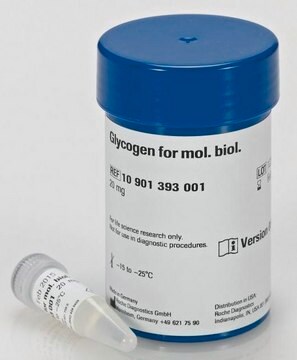83850
Ribonucleic acid from Torula utilis
Mr 5000-8000
Sign Into View Organizational & Contract Pricing
All Photos(1)
About This Item
Recommended Products
grade
for molecular biology
Quality Level
form
solid
mol wt
Mr 5000-8000
impurities
≤10% water
solubility
0.1 M acetate buffer pH 5.0: soluble 10 mg/mL
shipped in
wet ice
storage temp.
−20°C
General description
RNA from yeast is used in molecular biology laboratories as a carrier during nucleic acid purifications. When used at 10-20 μg/ml, the tRNA acts as a potent co-precipitant that allows for maximal RNA recovery (when working with limited samples).
Application
Ribonucleic acid from Torula utilis was used as a standard in ribonuclease activity assay of certain ribonuclease family members. It was also used as a standard to determine RNA concentration by orcinol assay.
Suitable for use in nucleic acid purifications.
Storage Class Code
11 - Combustible Solids
WGK
WGK 3
Flash Point(F)
Not applicable
Flash Point(C)
Not applicable
Personal Protective Equipment
dust mask type N95 (US), Eyeshields, Gloves
Certificates of Analysis (COA)
Search for Certificates of Analysis (COA) by entering the products Lot/Batch Number. Lot and Batch Numbers can be found on a product’s label following the words ‘Lot’ or ‘Batch’.
Already Own This Product?
Find documentation for the products that you have recently purchased in the Document Library.
Customers Also Viewed
Debi Ranjan Tripathy et al.
Analytical biochemistry, 437(2), 126-129 (2013-03-19)
The ribonuclease (RNase) activity of ribonucleases has been assayed by observing the change in fluorescence intensity of ethidium bromide on binding with yeast RNA. The binding of EtBr with RNA was monitored via UV-vis and fluorimetric methods. The degradation of
Russel J Lander et al.
Biotechnology and bioengineering, 79(7), 776-784 (2002-09-05)
Preparative-scale purification of plasmid DNA has been attempted by diverse methods, including precipitation with solvents, salts, and detergents and chromatography with ion-exchange, reversed-phase, and size-exclusion columns. Chromatographic methods such as hydrophobic interaction chromatography (HIC), reversed phase chromatography (RPC), and size
Our team of scientists has experience in all areas of research including Life Science, Material Science, Chemical Synthesis, Chromatography, Analytical and many others.
Contact Technical Service
